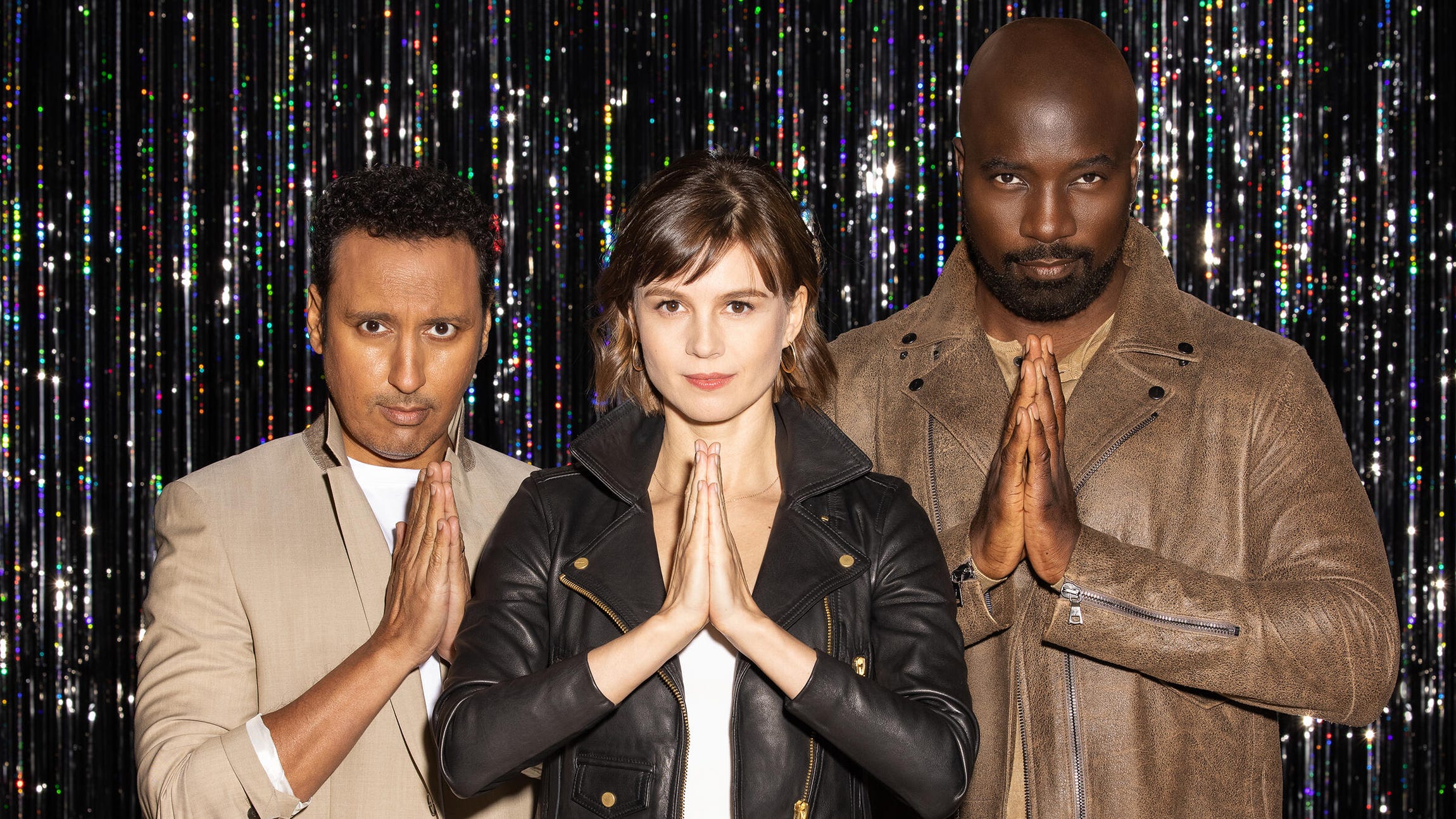
Evil Is the Best Show on TV Right Now
From broadcast to streaming, the sinfully good procedural is on a hot streak. The cast and creators confess all.
Aside from, obviously, the whole demonic possession thing, what makes exorcisms scary? According to The Exorcist, the 1973 horror classic, it's how rare they are. According to Evil, Robert and Michelle King's sublime Paramount+ drama, it's how rare they aren't. The priests on Evil who know how to perform exorcisms are in demand and overworked, a far cry from The Exorcist's Father Damian Karras, who, when asked what he could do for someone who needs an exorcism, quips that he'd "have to get them into a time machine and get them back to the 16th century." He could also go to streaming.

Evil isn't an exorcism-of-the-week procedural; the Kings, who had no interest in trying to outdo The Exorcist, made sure of that. But the series does suggest that exorcisms are happening constantly, right under our noses. What was once arcane is now everywhere. The world, as Evil's heroes all agree, is getting worse.
Evil stars Katja Herbers, Mike Colter, and Aasif Mandvi as a trio of investigators looking into claims of demonic possession on behalf of the Catholic Church. Colter's David Acosta is a priest in training. Herbers' Kristen Bouchard, a forensic psychologist and lapsed Catholic, and Mandvi's Ben Shakir, an atheist tech consultant from a Muslim family, are the skeptics David recruits to keep him honest. Where David sees demons, Kristen sees mental illness, and Ben sees faulty wiring or noisy pipes. "We are kind of like a trinity, the three of us," Mandvi told TV Guide. "David feels like he's always looking to the heavens, Kristen is always looking at the human, and Ben is kind of planted into the earth." It's rare for any of them to be proven right — and even when they are, are they really?
The characters get a kick out of how differently they see the world, which was important to the Kings. The series emerged from the husband-and-wife showrunners' own spiritual debates: Michelle, a secular Jew, and Robert, a practicing Catholic, are affectionately baffled by each others' beliefs. "Michelle will ask me, 'You believe in the devil, then?'" Robert King said. But although they disagree on the source of the problem, both saw the same patterns when they watched the news over the last few years. "There was something almost viral about how evil acts were happening," Robert explained. This wasn't like the political headlines the Kings toy with on their acclaimed legal drama The Good Fight. This was "something more, almost like an illness."
The 100 Best Shows on TV Right Now
Fortunately, the Kings are masters at making contemporary anxieties feel like a party. "We enjoy embracing genres, and they make our shows less pretentious," Robert said. "If our thoughts were really spilled out on the page in essays, it would be the most pretentious thing you'd ever read." Horror makes their big ideas cool. And Evil is fluent in horror; the Kings cite influences ranging from Charles Laughton's 1955 thriller The Night of the Hunter, which inspired the way the show's visuals are always pointed to the heavens, to spooky short stories for kids, the kind where a woman might sit next to someone on a bus only to turn around in the end and find she's disappeared. There are the expected homages, too: the Satanic pregnancy of Rosemary's Baby, the spiritual terror of (of course) The Exorcist. The structure of the series came to the Kings after they read about church assessors who investigate potential possessions, which opened up the story to an X-Files spin. An irreverent supernatural procedural was born, much like the goblin baby that was later born on the show.

Evil premiered in 2019 on CBS, a normcore treat that was even more exciting because it somehow made it to network television. A psychological horror show with a demon therapist aired after a Thursday night comedy block anchored by Young Sheldon. Evil is a much more natural fit as the weirdo darling of CBS's streaming platform, Paramount+, where it's moved for Season 2 (returning Aug. 29). Said Katja Herbers, "I think we were always a streaming show just posing as a network show." The second season was originally written and filmed for CBS, but thanks to editing, Evil's inner streaming show is already starting to break through; episodes are a little longer, and the language is a little less PG.
But the series is still shaped by its network TV roots. Evil is the best show on TV because it loves all the rules that come with being a procedural, and the thing it loves most about those rules is that it can break them. Procedurals are a comfort genre. With surprisingly grim twists, trippy hallucinations, absurd humor, and transgressive scares, Evil aims to unsettle. As it blows up procedural norms from within, it's also blowing up its characters' trust in an orderly world — until, by the Season 1 finale, the woman who began as the show's voice of secular reason is possibly possessed.
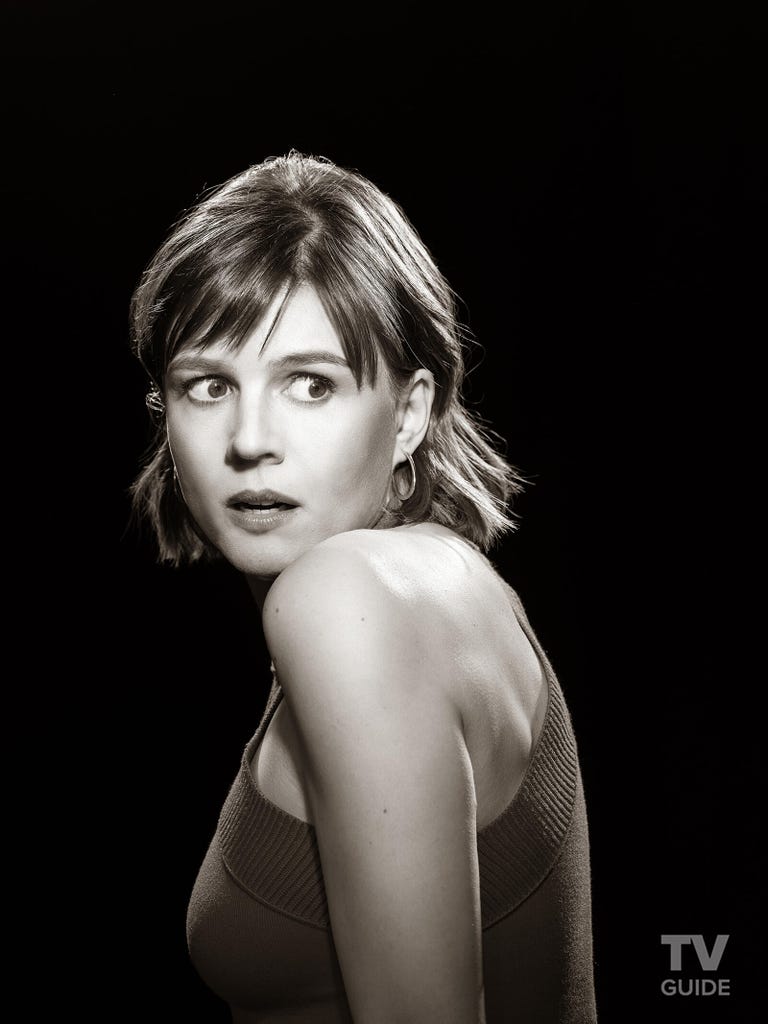
In hindsight, it was an appropriate last gasp for Evil's network run: The final shot of the first season found Herbers' character, Kristen, burning her palm on a rosary after killing a serial killer who threatened her daughters. "The way that she looks at herself in the mirror is like, 'You gotta be kidding me,'" Herbers laughed. The series has left the door open to multiple explanations, treating Kristen's potential possession not as a supernatural mystery to be solved but as a way to explore slippery moral slopes. "We took as serious that burned cross on her hand at the end of the first season," Robert said. "That is the drive of this season: Is that a supernatural evil that's taking over her, or is it that psychologically it's easier to do bad things if you've done one majorly bad thing?"
Herbers leans toward the latter. She doesn't believe Kristen is possessed any more than Kristen herself does, and she hasn't been playing her that way, preferring to dig into the psychological explanations for her character's behavior. Her performance this season has brought out a fascinating danger in Kristen. "She doesn't seem to be a victim of this act; she also seems to be weirdly put in her power by it," said Herbers. "She now knows that she can just take these guys out." And yet Kristen is not at peace with herself. She's so certain that she did the right thing as a mother that her lack of remorse has become its own kind of guilty conscience. Said Michelle King, "She is looking at herself saying, 'Why is this not more problematic for me?'"
This year's midseason finale, "C Is for Cop," added something darker to the thrill of watching Kristen get away with murder. In an episode about institutionalized racism in police departments, Kristen confessed her guilt to her cop friend, Mira (Kristen Connolly), and was let off the hook. The writers' room had been split on whether to even pursue the crime-and-punishment angle of Kristen's guilt, but when writer Aurin Squire, working in the aftermath of George Floyd's murder, came up with an episode about police corruption, they found a way to tie up Kristen's loose ends and make the audience uncomfortable at the same time. The Kings liked the idea of confronting the fact that even a likable white character benefits from her whiteness. "Not only has she murdered somebody, but then she gets off because of police corruption and white privilege," Michelle said. "And you're supposed to say, 'Yay?'"
One place Kristen hasn't turned for absolution is religion. "I think she's done with the church," said Herbers. "Except for David. Except whatever David's doing is interesting." Evil admires people of earnest faith, but the Catholic Church as an institution functions as the show's crooked authority figure, filling the same role a corrupt police precinct plays in a cop show about people trying to change the system from within. The second season has unearthed racism in the church, too, pushing Mike Colter's David to consider how the institution has failed its Black priests and parishioners. And yet every time David, now on the threshold of ordination, is told he shouldn't want to be a priest, he only digs in harder.
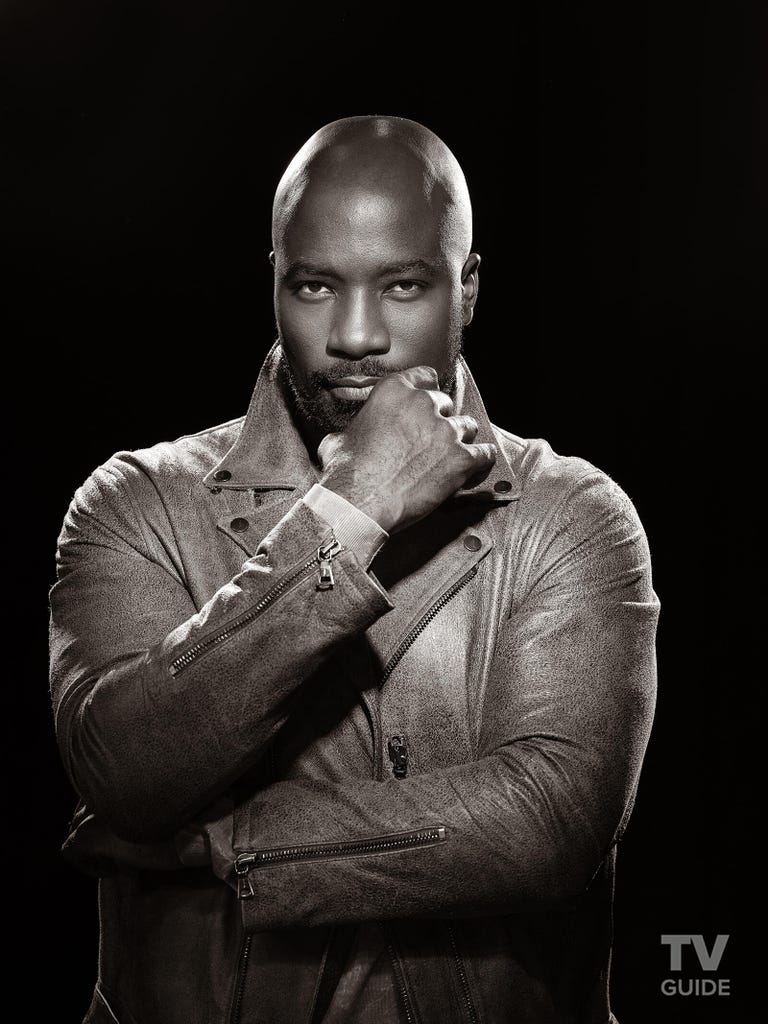
"He doesn't shy away from trying to be the person that breaks down barriers in some way, shape, or form in the Catholic Church," said Colter. The actor believes David's faith in God outweighs his misgivings about the church, but he admits his character also has a hero complex, stoked by the visions he gets. "There's a certain part of him that's getting a high and a rush off of having a relationship with God, contact with God." It's the same rebellious streak that draws David and Kristen together: They each like breaking the rules.
"I think it's a bit of a forbidden fruit, on both sides," Colter said. Kristen is married with four children; David is on the verge of becoming a man of the cloth. The actors are aware that the temptation might be the whole point. "It's a physical attraction, it's an intellectual attraction, it's a mutual respect," said Herbers. "They're kind of perfect for each other, but it's totally not going to happen."
Kristen's relationship with Aasif Mandvi's Ben is harder to define, which is why it's become one of the show's most compelling dynamics this season. "It dips toward sibling joking, but then you see that with Ben [and his sister], so you know it's different than that," said Michelle. "There's just the tiniest bit of flirtation, and yet this great camaraderie." Ben has also become a "grumpy uncle," as Mandvi puts it, to Kristen's four daughters, whose chatterbox energy plays brilliantly against his gruff sweetness. "Robert gave me this note where he said, 'Don't play it Disney dad,'" Mandvi recalled of his first scene with Kristen's girls. "'Play it more like you find them a little annoying. And that's kind of why they like you.'"
Season 2 has tested Ben as only Evil can: by giving him a sleep demon. In the first season, Kristen was haunted — maybe in reality, maybe just in her dreams — by a knife-wielding demon named George (Marti Matulis). Now, Ben is dealing with his own night terrors courtesy of succubus Abbey (Ashley Edner), who needles him to talk about his Muslim upbringing. "He's confronted with a lot of that stuff that he is dispelling or trying to push away," Mandvi said.
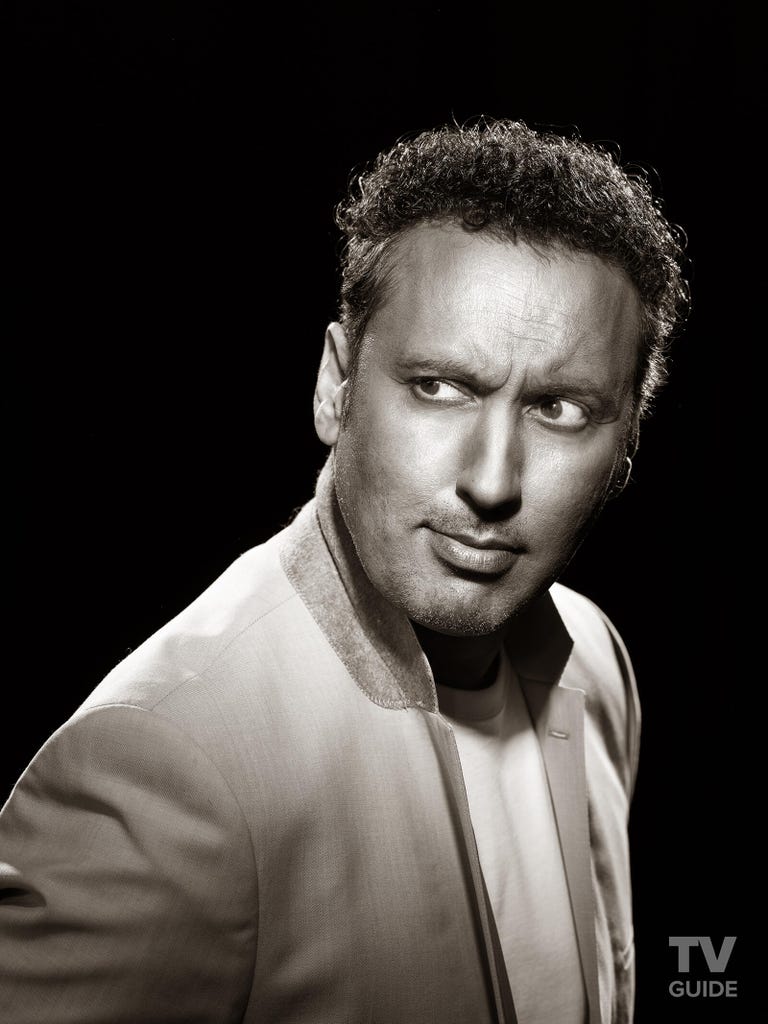
The more Evil delves into Ben's past, the more the show's perspective on religion expands beyond Catholicism. It's a testament to smart casting; Ben wasn't written as coming from a Muslim family until Mandvi joined the show. "I remember the original description in the audition was a cross between Patton Oswalt and Penn Jillette," Mandvi recalled. Giving Ben a Muslim background opened up new angles on his character. Said Robert, "Aasif just blew us away in his audition. Once you've got him, it seems idiotic to make him some suburban dad guy." One upcoming episode was inspired by a story from South Asian folklore that Mandvi learned from his grandmother (the actor teased, "It scared the bejesus out of me when I was a kid"), while an early Season 2 episode featured dueling Catholic and Muslim exorcisms that threatened to put Ben at odds with the team.
The Kings are always looking for twists that keep their exorcisms from feeling routine. "We don't have both legs in the supernatural. Some things might seem supernatural and then have a kind of Scooby-Doo explanation, and then the opposite could be true, too," said Robert. This season, much of that unpredictability has come from Michael Emerson's gleefully sinister villain Leland Townsend, who's signed himself up for a series of sham exorcisms with ulterior motives. "I'm supposed to let David know that this is a performance, it's for his benefit, and it's just a goof on the church," said Emerson.
Evil gets an assist on its exorcism scenes from an actual monsignor who consults on set. "It's like asking somebody who's been to space what it's like," said Kurt Fuller, who plays Kristen's therapist, Dr. Kurt Boggs. (Fuller joins Andrea Martin, appearing this season as Sister Andrea, and Season 1 guest star Renée Elise Goldsberry, who played church attorney Renée Harris, in the pantheon of actors the Kings have cheekily allowed to keep their names.) Emerson is less charmed by the monsignor than Fuller is. "I'm kind of afraid of him," Emerson laughed. "The scenes I'm in, they're often really blasphemous… I just feel like, oh, I need to stay away from the serious, worldly power of the church, for fear that they will punish me in some way."
In a landscape of villains who are either intimidatingly silent or smooth-talking charmers, Leland is neither. He's a seemingly unremarkable man who — for reasons either demonic or delusional — holds a surprising amount of sway over people. "I like the dithering, kind of social part of him," said Emerson, who thinks his character is better played as a person than as a demon. But Leland turned out to be a more familiar person than the actor bargained for. Emerson was caught off guard when he got the script that revealed Leland's humble backstory: marching band; Roosevelt High School; Des Moines, Iowa. "Where I went to undergrad was about a 10-minute walk from Roosevelt High School. I'm not kidding," said Emerson, who grew up in Iowa. "And the marching band? Marching band was my life in high school." Emerson was amused by the parallels. The Kings were surprised. When they learned — apparently for the first time, while speaking to TV Guide — that Leland's supposedly sad-sack life mirrored Emerson's real life, Robert put his face in his hands.
"We were always going for the fact that he looks inconspicuous and looks like someone who might have had a marching band past," the showrunner explained, laughing. "All the demons are called George and Mike and Abbey. Everybody in the show that's evil is very traditional, very much of the country club type, or the suburban type."
Demons are just regular guys, and regular guys can be demons: This is how Evil blurs the line between capital-E evils and the evils people cope with every day. It commits a little playful blasphemy even as it validates the terror of being alive right now, in a time when technology feels like the devil. "We live in a world where good and evil have never been so easy to see," said Fuller. "Evil speaks to the pressures of living in this world every day — you can make a right move and things go wrong." It's the apocalypse as told through social media.
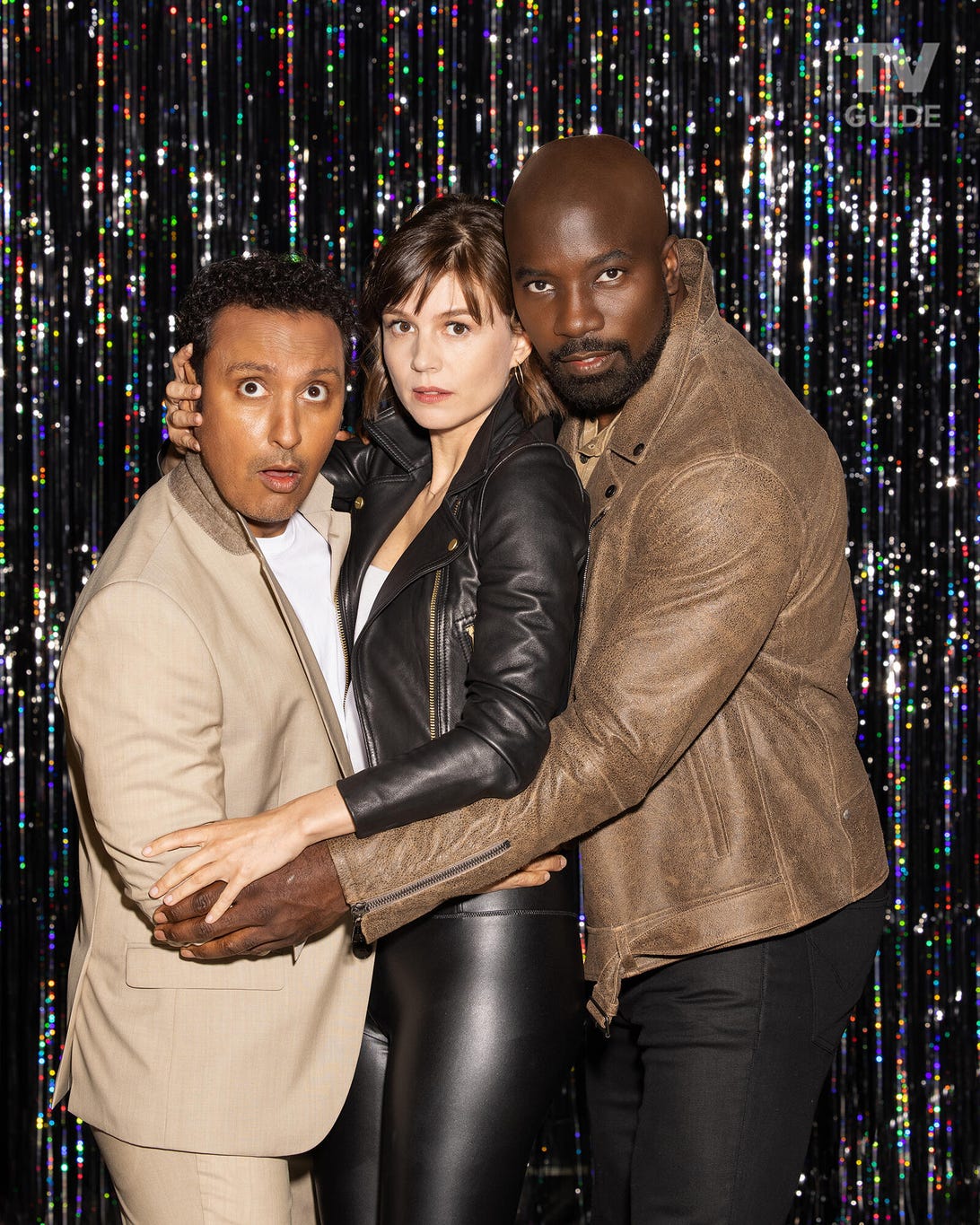
Evil's writers follow parallel tracks for every story, making sure it can be explained on both a psychological and a supernatural level. The Kings believe this is the key to taking society's illnesses seriously, which is one of the reasons they don't intend to either prove or debunk the paranormal anytime soon. "If you suddenly said things were all supernatural, or that the supernatural truly existed, I think you wouldn't be able to look into, you know, the bias against African Americans in the health system," said Robert. "Because suddenly [the excuse becomes], 'Oh, well, that's just the devil. The devil made them do it.'"
No episode of Season 1 was more horrifying than "Room 320," which trapped David in the hospital in the care of a racist nurse, and which never implied that the devil was making her do it. But as Colter points out, Evil is still only gesturing at the scope of racism in the real world. "I don't think we overtly tackle too many racial issues, because that's not necessarily what the show is. It inherently becomes that because I'm part of the show, and we live in America, and that's just the way it is," he said. "We put in just enough of that spice, just to make people understand that yes, we are here in the real world, and we're not ignoring all the things that you guys see."
The focus in the writers' room, according to the Kings, is always on finding the "ghost story metaphor" for the issue they want to explore. In lesser hands, Evil's parables about poisonous YouTube influencers and zombified factory workers could veer too literal — Buffy Season 1 for the modern liberal. But Evil is self-aware, always winking at the camera. "It's almost like a satire," said Colter.
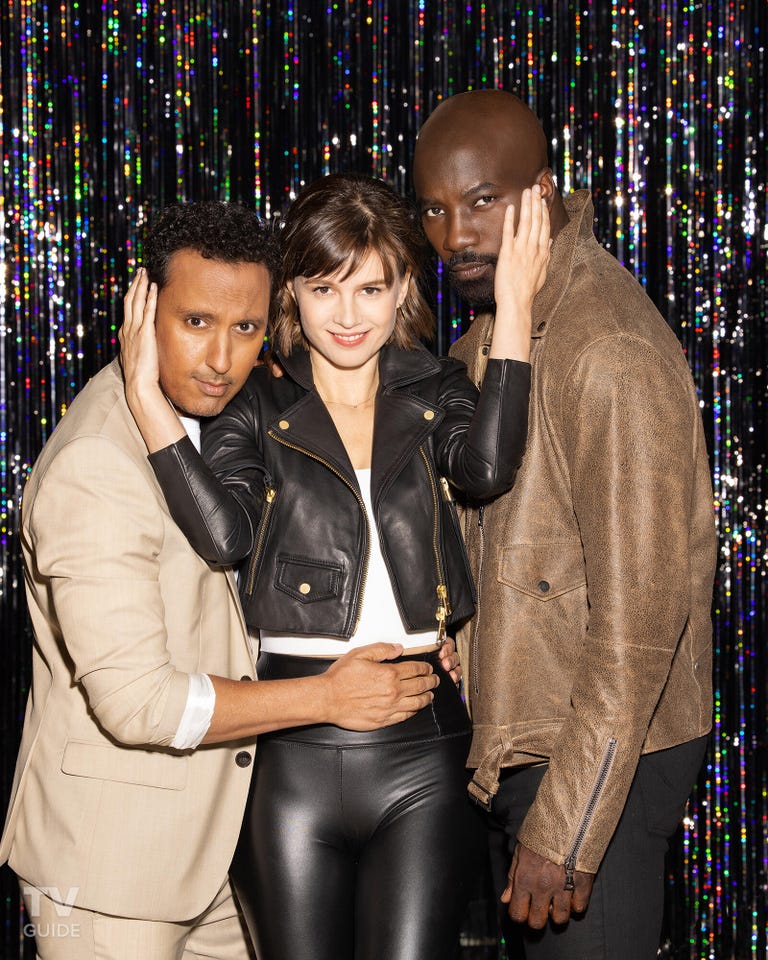
What if, for instance, possession is just a metaphor for becoming a woman? This season is beginning to make it look like possession might run in the Bouchard family. "I feel like all the daughters are going to be possessed," said Skylar Gray, who plays Lila, one of Kristen's four daughters. Gray pointed to the Season 1 Christmas episode, in which their character was tormented into stabbing her own ear. Now, Lexis (Maddy Crocco) is chomping down on her dentist's finger while she's under anesthesia. "It is definitely crazy, but I do have to say, she is growing up. All this stuff could just be explained because she's getting older," said Crocco, summing up the fact that Evil's view of womanhood allows for biting people. But there could be more to the story; Lexis was conceived with the help of a potentially sinister fertility clinic, and Crocco has a theory that Leland could be Lexis' biological dad.
Kristen's mother, Sheryl (Christine Lahti), may not be possessed — as far as anyone knows — but being dumped by Leland has unleashed an off-kilter anger in her, too. "It's so much more fun than playing the nice grandma," Lahti said. Before Leland made her snap, Sheryl spent years suppressing her rage over a series of bad relationships, which Lahti learned when she read a Season 1 scene in which Sheryl tells Lexis to hit a bully in the face with a rock. Lahti remembered calling the Kings after she got the script: "I said, 'OK, this is so great, I love this, but I need to know what the hell you're thinking.'"
"I think a lot of it is taking what the church thinks of as the cliché of the polite woman and twisting it," Robert explained. The Bouchard girls, based on Robert's four sisters, are drawn to danger; when they hear about a literal elevator to hell, they beg to ride it. The actors say the daughters learned to be thrill-seekers from their parents: Kristen is a former mountain climber, and her husband is, hilariously, mostly absent because he's climbing Everest. Brooklyn Shuck, who plays eldest daughter Lynn, said, "Kristen doesn't take anything from anyone, and I think having her to look up to and seeing how she handles things calls for us to be brave."
Kristen's scenes with her daughters are consistently charming, spilling over with natural warmth. "Because the show is genuinely scary, I think it was important to counterbalance that with a very loving and warm home life," Herbers said. There's a lively chaos to the Bouchard family, which starts with how the daughters are written. Shuck, Gray, Crocco, and Dalya Knapp (who plays youngest daughter Laura) are given room to improvise, and the things they do when they're goofing around on set often find their way into the show. ("I like how my character can just say what she wants," said Knapp. "Or at least I do.") In their scenes together, the actors are usually given three lines to divide up as they choose, and the one without an assigned line will improvise, with the help of the script supervisor. "We'll do rock paper scissors over a line," Gray said.
They might get their spontaneity from their TV mother, too. "Sometimes directors will come in and they'll say to Katja, 'So how are you gonna do this?' And she'll go, 'I have no idea. I don't know,'" Fuller said. "And then she starts, and the scenes can go anywhere." Now that this season, which was originally intended for CBS, is re-edited for the looser world of Paramount+, some of the cast's more experimental takes are finding their way back into the show. "Sometimes Katja shot an edgier version because she's an interesting actress," Robert said. "Same with Mike. They're interesting and want to go deeper, so we're now able to open those gates a bit."
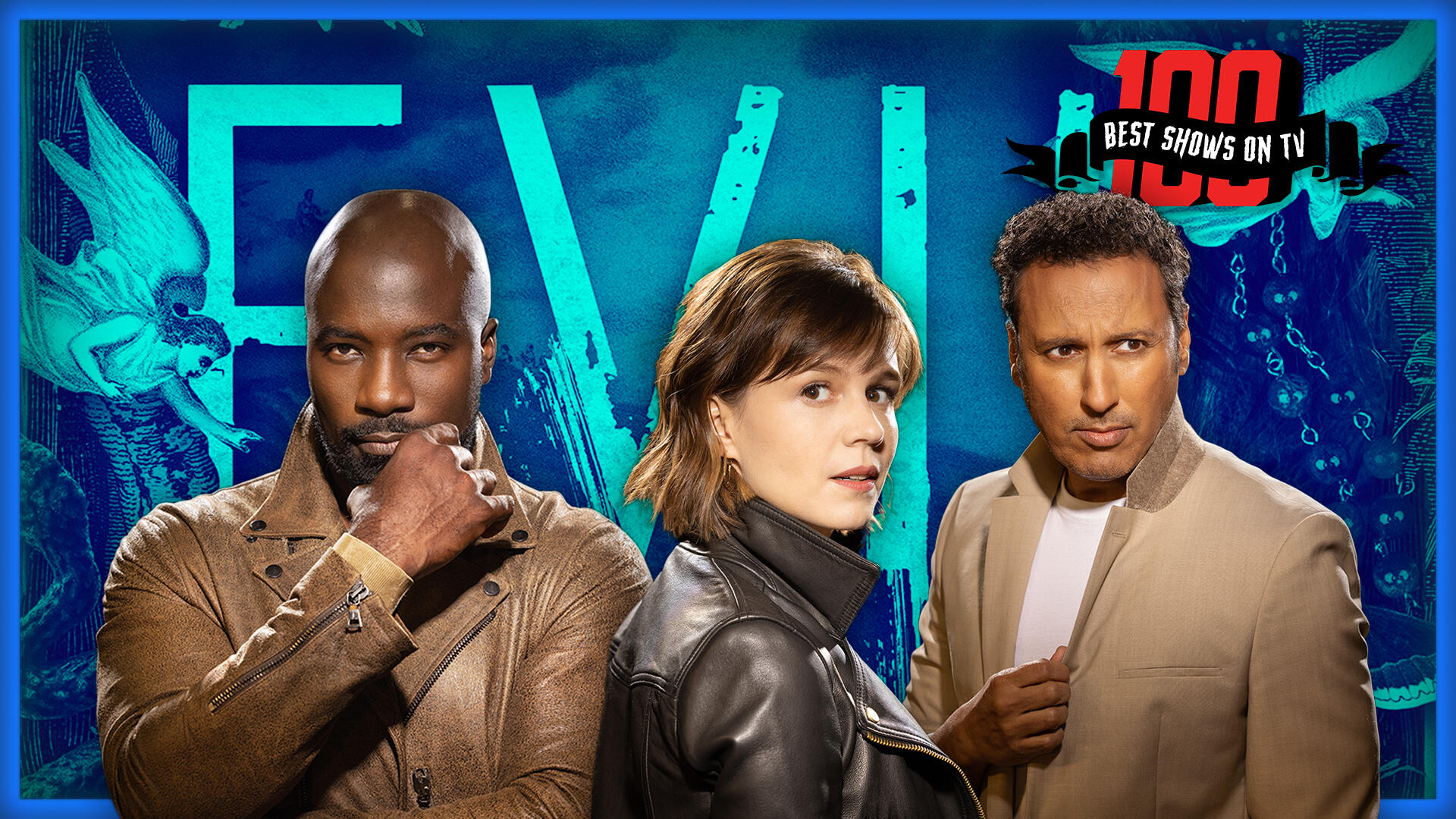
With a third season renewal already locked in, the team behind the show is about to find out what Evil looks like when it's written and filmed without network restrictions in mind. But streaming has already been good to Evil, and not just because the characters occasionally say f--- now. Season 2 is sharper, stranger, and more ambitious, and it's proven that the series didn't need to be the rebel on the network TV schedule (how funny, a demon therapist on CBS!) to get people's attention. The Kings are still going above and beyond for it anyway. The showrunners hid puzzle pieces for an elaborate map in certain frames of Season 1, which could only be solved with the help of the numbers in the episode titles. As for the Season 2 puzzle, all they would tease is that it exists.
But on screen, there's no solving what's really going on. Mandvi recalled being struck by a scene early in Season 2, when Ben's succubus casually removes her retainer as she prepares to bite him. "Either this demon really has a retainer, which is crazy — like, why?" Mandvi laughed. "Or if Ben thinks it's in his imagination, then why did he come up with a demon that has a retainer? Why not just come up with a demon?" On Evil, the only two possibilities are that the world is absurd or that people are.
PHOTOS: Celebrate Evil With These Exclusive 100 Best Shows Portraits
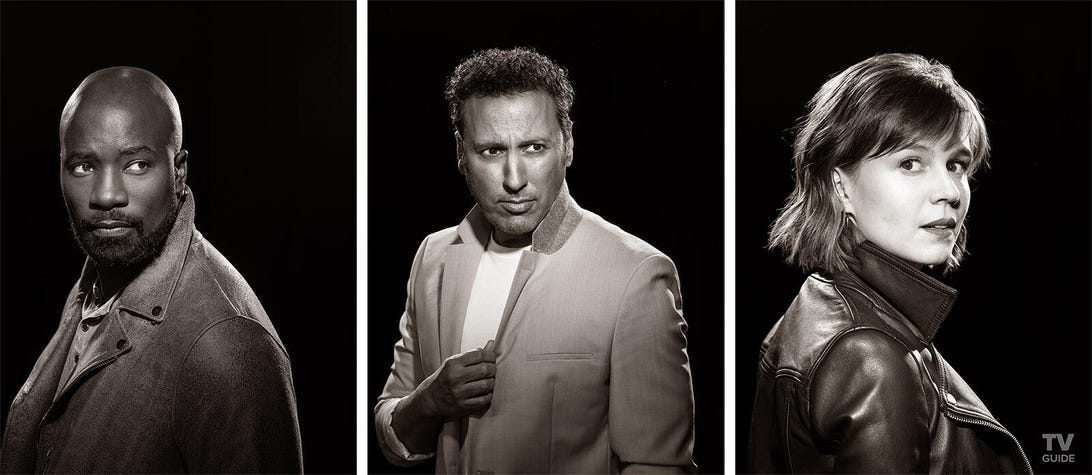
Art Director and Producer: Jessie Cowan
Photographer: Greg Endries
Graphic Designer: Lewi Yonas
Stylist: Michael Fusco
Wardrobe Consultant: Daniel Lawson
Hair for Katja Herbers and Aasif Mandvi: Emily Rosko
Makeup for Katja Herbers: Rachel Hevesi
Makeup for Mike Colter and Aasif Mandvi: Milagros Cerdeira
Video Producer: Aaron Segura
